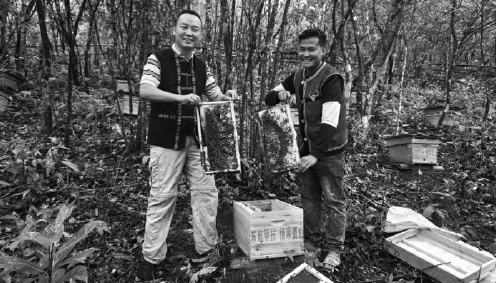Airline getting county's honey industry buzzing
China Eastern invests $120,000 in Cangyuan to spur villagers' fortunes

What connects buzzing bees and roaring planes? The answer is China Eastern Airlines.
The Shanghai-headquartered airline has been assisting a remote county close to the border of China and Myanmar in increasing local residents' revenue, developing a modern beekeeping industry.
Cangyuan county in Lincang, Yunnan province in Southwest China, is home to some 148,300 people from the Va ethnic group, who account for 85.51 percent of the county's total population and around 40 percent of China's total Va people, according to the county government's official website.
More than 75 percent of the county is covered by forest, with seasonal primary and auxiliary nectar sources available throughout the year. The rich plant resources give Cangyuan unique advantages in developing the beekeeping industry.
However, local beekeepers failed to take full advantage of such a natural endowment and the industry remained fragile in the county, partially due to a shortage of modern equipment and technology, as well as industrial expertise.
Mei Yibao, who was dispatched from China Eastern Airlines to serve as a grassroots official at Anye village in 2019, still remembers the difficulties the village faced when he took office. Back then, 408 families, or 81 percent of the village's total households, were registered as poor.
The turning point came when China Eastern Airlines set out to help Lincang county upgrade its beekeeping industry after the company's executives learned about Anye village's sound natural resources and industrial foundation for the beekeeping business on an inspection tour of Cangyuan county in 2019.
In early 2020, the airline spent 895,000 yuan ($123,645) in ordering beehives and related equipment, putting them into use at the China Eastern Airlines' Cangyuan Honey Industry Poverty Alleviation Base in the village.
As a result, the number of beehives in the village increased to 2,000 that year, doubling that of 2019.
The company also offered specialized training to locals and signed a centralized procurement agreement with the county. It turned out that the bees turned the ailing village around within a single year. The village's collective business income jumped from 30,000 yuan in 2019 to more than 1 million yuan in 2020.
Mei discovered black honey, a variety of local honey, different from what he had seen before elsewhere. To figure out where it comes from, the airline helped to contact the Institute of Apicultural Research at the Chinese Academy of Agricultural Sciences.
In response, Huang Jiaxing, a scientist at the IAR, who specializes in research on Apis cerana, a honeybee species native to China, made his first visit to Cangyuan in October 2021. After more than a month of surveys on local apiaries in various townships, he found the key to the black honey — Leucosceptrum canum, a blooming plant species indigenous to mountainous regions in the county.
It is a species of Chinese medicinal herb that grows at an altitude of more than 1,500 meters, blooms in winter and has a flowering period spanning up to two months. In the county, it has covered a combined area of 11,533 hectares, Huang said.
The honey produced from its flowers looks black, so it is called black honey. As they are pure wild flower and have high requirements for their habitat, they are considered free from pollution and agricultural chemical residues. Therefore, the quality of black honey is high, earning it the reputation as "prime honey".
Black honey has enormous potential for growth and can be developed into a local specialty product, Huang said.
With the support of China Eastern Airlines and the Cangyuan government, Huang led a team to establish an experimental station at Banhong, another village in the county, providing scientific guidance for beekeeping and the layout of local apiaries.
Huang's research team selected Apis cerana as the "leading role" for the vitalization of the industry. They picked out excellent varieties of bees and established a bee breeding center to preserve and utilize these superior Chinese honeybee varieties.
They have also found ways to address the problem of Chinese honeybees being "persecuted" by hornets; gradually changed locals' traditional beekeeping methods; and tailored breeding and management techniques for each beekeeping stage based on the local climate characteristics, enhancing the bees' ability to withstand harsh environments.
To address the issue of long rainy seasons and heavy rainfall in the county, Huang designed beehives with rainproof roofs.
"Under the long-term guidance of the IAR expert team, our fellow villagers have learned techniques such as queen rearing and bee colony splitting. We have managed to breed 800 new queen bees, expanded our bee colonies to 1,000, and sold 500 colonies," said Yang Zhiliang, the Party secretary of the village.
In addition to cooperating with the IAR, the airline has joined hands with Tsinghua University to offer technical support and introduced a group of businesses from the industry chain to settle in the county, enhancing the local beekeeping and honey industry.
Since 2020, China Eastern Airlines has poured nearly 11 million yuan into a poverty alleviation program in Cangyuan. Fruitful efforts have enabled the company to enjoy the sweet smell of success.
Currently, Cangyuan is home to four companies, 19 farmers' cooperatives and one research team, achieving the integration, standardization and scale economy of the entire industry chain, ranging from raw materials' collection, processing and production to sales.
As of the end of 2023, a total of 22,187 colonies of Apis cerana were raised across 10 townships and towns in the county. The industry has involved 1,773 farmer households, together producing 72.5 metric tons of honey. The output value of the honey industry coupled with related sectors has exceeded 12 million yuan, with an average household income increase of 6,814 yuan.
For villagers, thanks to China Eastern Airlines' help, the honey industry has given them a taste of a sweeter life.

Today's Top News
- Israel's Gaza takeover plan widely condemned
- S. Korea visa waiver spurs surge in travel interest
- Top cities signal easing to support property market
- Ties bolster heritage protection
- Gaza 'takeover' will ignite another horrific chapter for the Middle East: China Daily editorial
- STAR shines for innovative companies






























